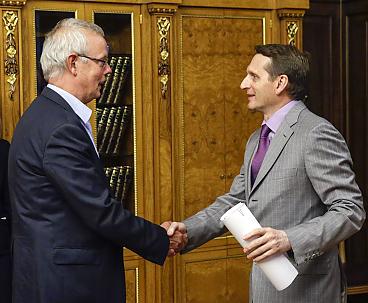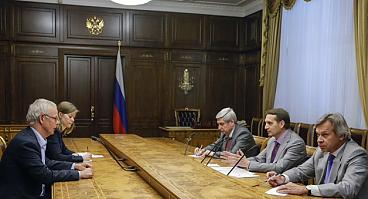SP Senator Kox in Moscow: Russia belongs in Europe
SP Senator Kox in Moscow: Russia belongs in Europe
‘Neither Russia nor the rest of the Council of Europe has anything to gain from an increasing confrontation. If European countries and their parliaments don’t talk to each other, mistrust and escalation will be the results. Because of Ukraine the situation in Europe is dangerous enough. My hope is that wise counsel will prevail on both sides so that we can restore cooperation. Russia belongs in the Council of Europe.’
SP Senator Tiny Kox made this appeal this week in Moscow, where he spoke with the president of the State Duma – the national parliament – the leaders of the formal opposition groups and the head of the Russian delegation in the Parliamentary Assembly of the Council of Europe (PACE), in which all European parliaments are represented, and in which Senator Kox is chair of the Left Group.
 Duma president Sergey Naryshkin (right) during the meeting with Tiny Kox
Duma president Sergey Naryshkin (right) during the meeting with Tiny Kox
Kox’s visit to Moscow had an informal character, the Russian delegation having suspended cooperation with PACE. This decision followed on the vote by a majority of the Assembly which in April removed the delegation’s voting rights in the wake of Russia’s illegal annexation of the Crimea. That annexation followed a major uprising by the people of Kiev in February. The uprising was itself provoked by the government’s decision in December not to sign, at least for the time being, an association agreement with the European Union, a decision which angered the Ukrainian opposition and disappointed the European Commission in Brussels.
Kox called on Moscow to do all in its power to resist increasing escalation and seek a rapprochement. State Duma President Sergey Naryshkin told him that he was in agreement, and that he would strive for a speedy return by the Russian delegation to the Strasbourg-based Parliamentary Assembly because dialogue is just what was needed. He would like on behalf of the Russian parliament to meet with the PACE president to discuss the question of whether and how relations might be restored. That could, in his view, take place in Strasbourg if it were not for the European Union sanctions.
Naryshkin added that he hoped in addition that now that Ukraine had elected, last Sunday, a new president, efforts could be made towards ending the violence in the divided country and a start made on the necessary reforms. He also hoped that agreement could be reached between the rwo Presidents, Poroshenko and Putin.
 Tiny Kox (left) meeting with (from left to right) Duma vice-president Ivan Melnikov, Duma president Sergey Naryshkin and delegation leader in the Council of Europe Alexei Pushkov
Tiny Kox (left) meeting with (from left to right) Duma vice-president Ivan Melnikov, Duma president Sergey Naryshkin and delegation leader in the Council of Europe Alexei Pushkov
Attempts to allow the return to PACE of the Russian delegation were supported by delegation leader Alexei Pushkov (from the governing party, United Russia), as well as the leaders of the two formal opposition parties, Gennady Zuganov (Communists) and Nikolai Levichev (Just Russia, a social democratic party). ‘But’, Pushkov added, ‘we don’t want to be a second-class delegation. If we talk, we want also to vote.’
Kox assured the Russians that he would report his findings to the leaders of the other political groups – conservatives, liberals, Christian democrats and social democrats – in PACE and to the 315-member Assembly’s president.
Whilst in Moscow the SP Senator also met with the newly appointed Russian human rights Ombudswoman, the Deputy Minister of Foreign Affairs for the Russia Federation and the head of the Office of the Council of Europe in Russia, which opened in March.
